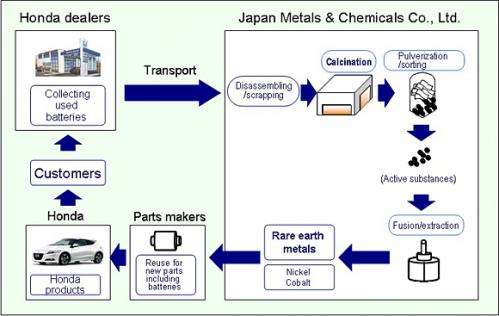(Phys.org) -- Honda Motor Co. this week made news with its announcement of a recycling breakthrough. The car maker, which manufactures hybrid vehicles, will start recycling rare-earth metals from the nickel-metal hydride batteries of its used hybrid cars on a mass-production basis.
Honda says its process move is a world-first--in that its decision does not merely involve a research experiment but rather a process that will be done on a mass production basis at a central recycling plant. The recycling will start very soon; Honda says the work is to begin at the end of this month. The process allows for the recovery of more than 80 percent of the rare-earth metals used in the nickel-metal hydride batteries. The process involves extractions coming from used batteries from Honda hybrids at Honda dealers inside and outside Japan.
The technology is a result of the company’s collaboration with Japan Metals & Chemicals (JMC), a company based in Tokyo. The press announcement carries a simple diagram of the recycling flow between dealers and factory, but with few details about how the process actually works.
Economists, however, saw no mystery in what the Honda move means in the marketplace. According to reactions from SmallCap Network, the high market prices of rare earth metals suggest “the company could have got it right in terms of economics.” Reuters, likewise, said the announcement has significant financial ramifications, Rare earth materials are used in everyday household items, gadgets, and vehicles all over the world.
China produces about 95 percent of the world’s rare earth supplies. With its monopoly on production, China, noting its concerns about the environment and resources, issued export controls, which sent prices rising. For Honda, the goal was specifically to look to recycling to meet its rare-earth metal needs. Honda says the initiative won’t stop at batteries either. It intends to grow out a list of components from which the metals can be recycled.
In its press statement, Honda said it intended “to further expand the recycling of rare earth metals in the future as the newly established process enables the extraction of rare earth metals from a variety of used parts in addition to nickel-metal hydride batteries.”
“Rare earth” metals refer to 17 metals that, as Popular Mechanics comments, “are mostly shunted off to a tacked-on lower line of the periodic table” yet are crucial to modern lifestyles, used in numerous applications for industrial, high-tech, and commercial products.
More information: Press release
© 2012 Phys.Org





















